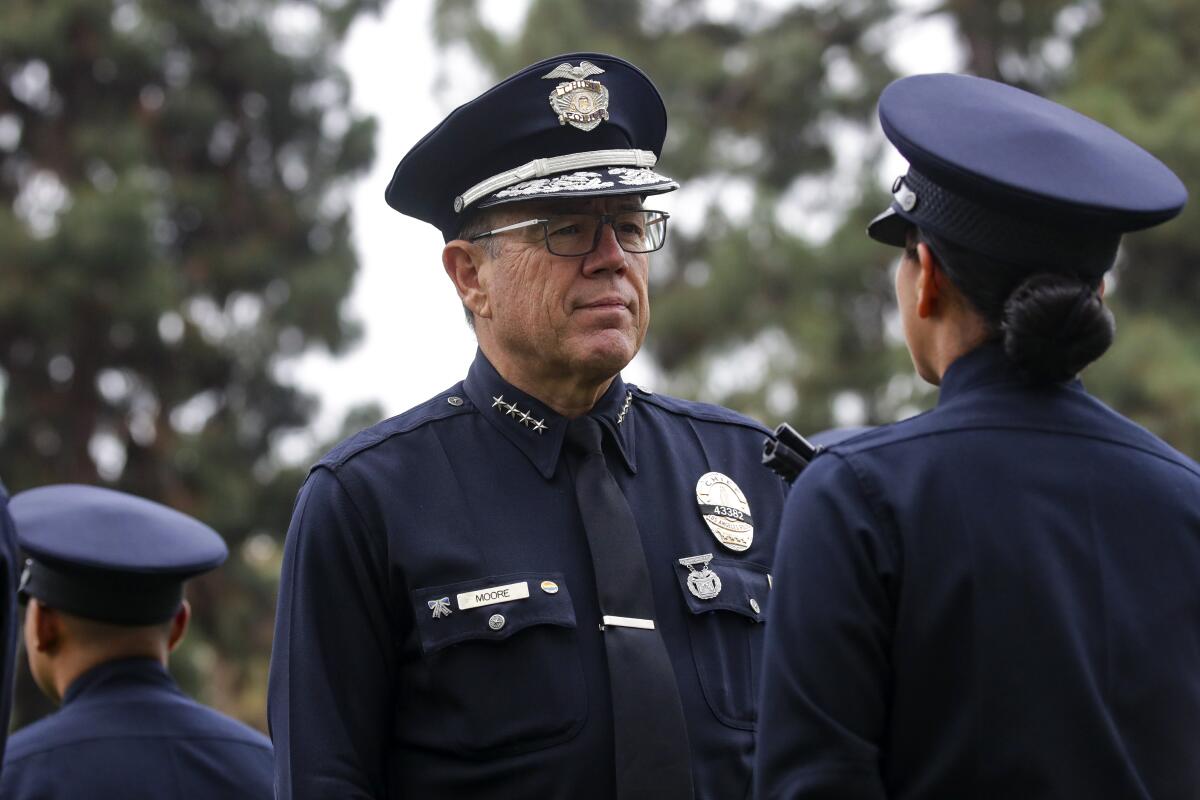Since photos’ release, LAPD has been quietly scrubbing police rosters from portal

- Share via
As the hand-wringing at Los Angeles Police Department headquarters continues over the release of police officers’ pictures, the city has been quietly scrubbing the names and ranks of cops from its public records website.
Earlier this month, hawk-eyed LAPD watchers began noticing the disappearance from the city’s records portal of LAPD personnel rosters that had previously been released through a public records request.
As with all city departments, the LAPD maintains a roster with the names of its employees, both sworn and civilian, along with other basic details, such as rank, assignments and years of employment. Members of the public regularly request the information, which is subsequently published to the department’s records portal. A review of the portal shows that in several cases, even though the records request itself is still visible, the rosters have been removed.
The rosters began vanishing shortly after the city filed a lawsuit against journalist Ben Camacho and the abolitionist group Stop LAPD Spying Coalition. The legal action sought to claw back thousands of officer headshots, in a move that was roundly condemned as baseless by 1st Amendment and media rights experts.
After the images’ publication, LAPD Chief Michel Moore and other officials began to suggest in news interviews that the photos of some undercover officers were mistakenly released and posed a safety risk. Moore later told The Times that he has taken steps to address the safety concerns of those whose photos were released.
Soon thereafter, the city began taking down the LAPD rosters, according to Stop LAPD Spying.
Even if the personnel records were previously available, their erasure sends the message that the public is not entitled to them, said Matyos Kidane, a local organizer.
“To remove access in that way is kind of the equivalent of destroying these records,” said Kidane, of Stop LAPD Spying, which published the images on a searchable database called “Watch the Watchers.”
The group has accused the LAPD of stirring controversy around the photos’ release in an effort to escape transparency. Its members said it counted at least nine instances in which information have been removed from the portal. While the original requests are intact, the accompanying records are no longer visible, according to the group.
“The city has a history of destroying records when they want to be held accountable for something,” said Kidane, referring to an episode in the 1970s in which a judge accused the LAPD of shredding four tons of citizen complaints to avoid disclosing them to the public.
An LAPD spokeswoman on Friday confirmed that Moore ordered the rosters to be removed “due to the inadvertent release of the photographs of those in sensitive and confidential assignments.”
According to the spokeswoman, Capt. Kelly Muniz, “nefarious actors” began “aggregating the various data sources to build profiles” of officers.”Those profiles were then being used to threaten, intimidate and create fear on the part of our police officers and their families,” Muniz said.
David Loy, legal director of the California First Amendment Coalition, said that generally speaking cities are not required to post public records online, with “limited exceptions for things such as agendas of Brown Act meetings and other things.”
And yet, he said, a city’s decision to remove records retroactively is troubling.
“I’m certainly not condoning this, don’t get me wrong. I’m not saying this is a good thing. I think agencies should be proactive as being as transparent as possible,” he said. “It absolutely defeats transparency as a matter of policy to take down or scrub public records from an agency website when they were previously posted.”
The photos’ release touched off a flurry of legal activity. The union that represents rank-and-file LAPD officers sued Moore, hoping to force the department to stop disclosing such images and claw back those already released. More than 300 LAPD officers who claim to work in sensitive assignments have also given notice that they intend to sue the city for negligence and for allegedly endangering their lives by releasing the images.
The city subsequently sued Stop LAPD Spying and journalist Camacho, who obtained the images in September through a public records request and related litigation. The legal team for Camacho, a reporter for Knock LA, filed a motion this week asking a judge to toss out the city’s lawsuit, arguing that the action was unconstitutional and retaliatory.
It’s impossible to tell how widely the images have spread online.
According to reporting by the Intercept, an online news site, the images have been published to the Internet Archive and the transparency collective Distributed Denial of Secrets, which has previously published materials leaked from other U.S. law enforcement agencies and from right-wing extremist groups.
Both sites have a history of rebuffing legal requests to take information down, according to the Intercept report.
Times staff writer Richard Winton contributed to this report.
More to Read
Sign up for Essential California
The most important California stories and recommendations in your inbox every morning.
You may occasionally receive promotional content from the Los Angeles Times.











